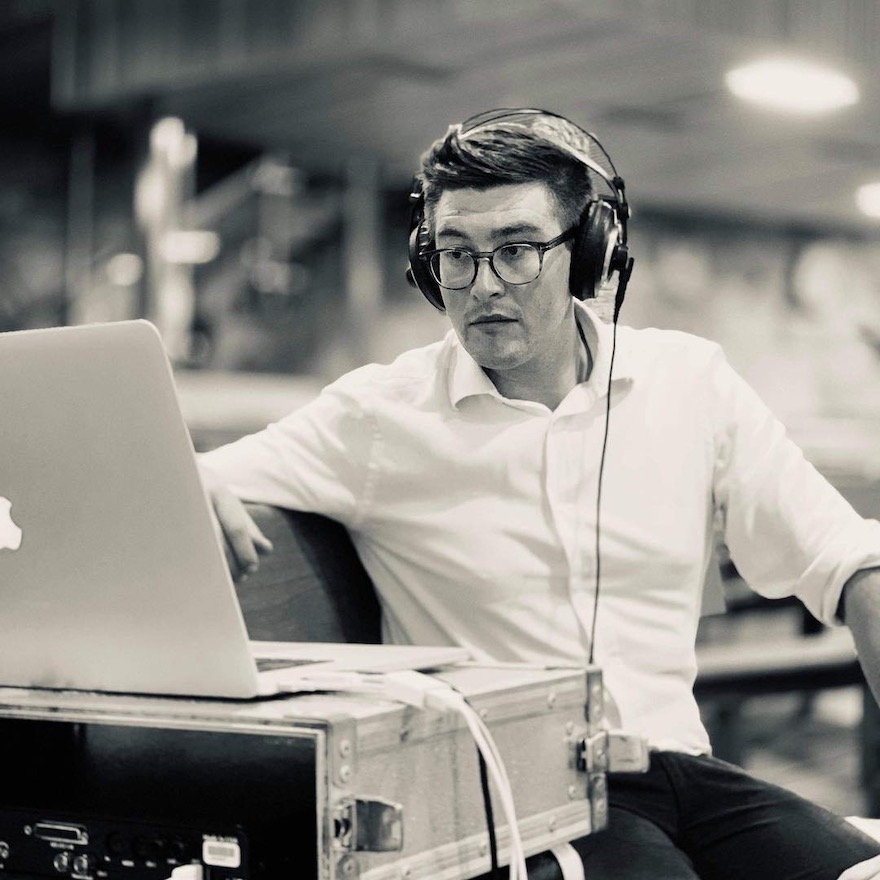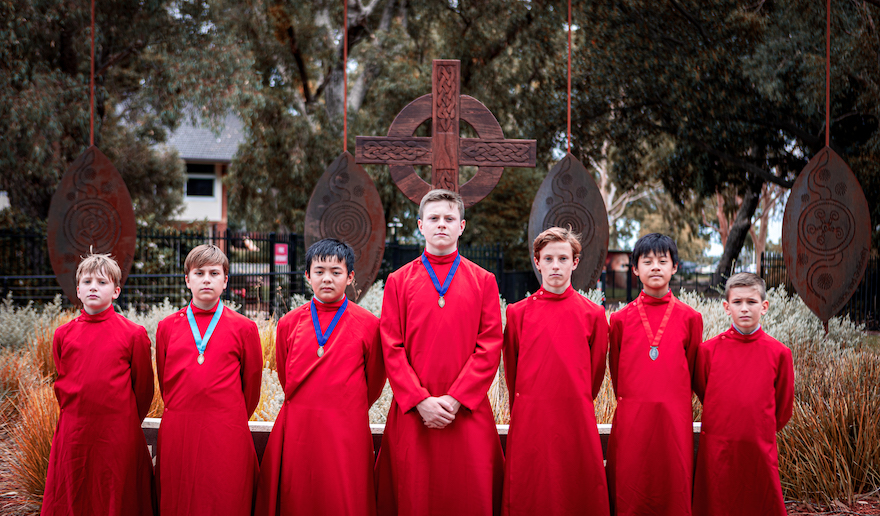Once the remit of English cathedrals, choral singing for kids is taking off in Perth. Rosalind Appleby talks to Hugh Lydon, who is passionate about building a singing tradition in Western Australia.
Helping young voices reach new heights
30 September 2022
- Reading time • 10 minutesMusic
More like this
- Rewriting tradition with skill and charm
- Close encounter stirs the soul
- The great unknown
Hugh Lydon arrived in Perth in 2010 with a vision to build a singing tradition in WA. The chorister from the Westminster Cathedral wasted no time, taking on teaching positions at John Septimus Roe and Aquinas colleges, directing the Giovanni Consort, founding the Perth Choral Institute and working as children’s chorus master for WA Opera. He shares his vision for singing with Seesaw readers.
Rosalind Appleby: Your childhood was drenched in choral music; you were singing professionally from the age of eight in London’s prestigious Westminster Cathedral program. What was it like as a child growing up singing?

Hugh Lydon: Singing at Westminster Cathedral for five years was a very formative experience, but also quite challenging – as the choir sang seven services every week, the choir school needed to also be a boarding school. This meant that homesickness was rife amongst the new choristers each year. However, the fact that all the choristers lived together meant that a strong bond was developed between many of us. The immersion of daily, high calibre music-making meant that I developed a love and knowledge of a genre of music that was previously alien to me. It was normal to sing Gregorian chant every day, paired with composers as diverse as Stravinsky, Byrd, Poulenc, Mozart and Roxanna Panufnik. The variety meant I was never bored, and always musically challenged. The choir recorded at least one album every year, so our standards had to be high. James O’Donnell, who currently works at Westminster Abbey and directed the choral music at the Queen’s funeral, was the Master of Music at Westminster Cathedral during my time there. I owe him a huge amount for shaping me into the musician I am today.
RA: Does the English chorister tradition translate to Australian children?
HL: I believe so; there are several cathedrals around Australia that use children’s voices to great effect. Thomas Wilson is doing an amazing job in St Mary’s Cathedral in Sydney, and many of the WA tenors and basses who are roughly the same age as I am learnt their trade under Simon Lawford as boy choristers at St George’s Cathedral. Boys’ voices tend to move down into the tenor or bass section at an earlier age here. In the UK most boys can still sing the treble lines until they are 13 or 14, whereas by that age here, the vast majority have slid into a lower part. From a training perspective, it means we have slightly less time to develop boys, but the bonus is that their adult voices do develop slightly earlier. I should point out that, whilst this choral tradition has over the centuries only been exclusively accessible to male voices, it is a very good thing to see that some Australian cathedrals are now providing girls with the same choral experiences. St John’s Cathedral in Melbourne has girl choristers, as does St Peter’s Cathedral in Adelaide. I hope that more follow suit.
RA: You founded the Aquinas College Schola Cantorum in 2019 and they have quickly established a reputation as one of Perth’s top children’s choirs, singing with the WA Symphony Orchestra, the WA Opera, as well as weekly services at St Patrick’s Basilica and other parishes. What are the key qualities for a successful children’s choir?
HL: I will always be indebted to Chris McMillan and David McFadden for inviting me to create a choral program at Aquinas College. The vision of both men is extraordinary. The Schola Cantorum began with 14 boys in the ensemble; that number has now grown to 37. Those original 14 boys act as mentors to the newer choristers, both from a musical and a behavioural perspective. They sing together six days a week, 40 weeks of the year. This creates familiarity between the singers, and an ever-expanding foundation for learning increasingly challenging music. In 2019 we would normally learn two-part repertoire, always accompanied by organ or piano. These days, the boys relish the challenge of singing unaccompanied music, often in six parts. The choir performs to the public every week, either at St Patrick’s Basilica on Saturday evenings, Aquinas College chapel services and events, or in collaboration with arts organisations, such as Britten’s War Requiem with WASO in August. New repertoire needs to be learnt on a weekly basis, as we must respect the liturgical calendar by singing appropriate music.

RA: Sacred choral music often requires musicians to sing in Latin, but the boys in Schola Cantorum have also sung in an even more ancient language. Tell us how the recordings of two songs in Noongar came about?
HL: In 2015, the Anglican Archbishop of Perth commissioned composer Perry Joyce to write a set of canticles in the Noongar language for a special Evensong service to celebrate the translation of St Luke’s Gospel into language. The Schola had learnt both songs relatively early in our formation, as NAIDOC Week plays a very important role in the college’s calendar. Aquinas College has more than 45 Indigenous students enrolled, so I felt that singing in language was an important development for the identity of the choir and the college. Every time we perform either song, they evoke a strong emotional response in the listener. I felt strongly that a wider audience than Perth should be able to access these pieces and sought permission from the Noongar community to record them. We recorded both songs with Alessandro Pittorino on organ in December 2021. Given that only three singers on both tracks were older than 16 at the time of recording, I’m very proud of the end result. Noongar is a powerful language that is very comfortable to sing. Given the huge success of WA Opera’s Koolbardi wer Wardong, I believe that we should explore as many options as possible to enable WA composers to write in language, across a range of genres.
RA: Why is it important for kids to be singing, and for there to be a choral tradition in Perth?
HL: Firstly, singing is free. It is a resource that we can all access, irrespective of our background and upbringing. There are also countless studies which demonstrate the benefit of singing on a person’s mental health and wellbeing, as well as forging a sense of community. It’s no coincidence that every single sporting team in Australia has a team song that must be sung (sometimes in the loosest term of that word) when they win. The gateway into singing is to do it as a group, either through karaoke, sporting events, Christmas carols or even Happy Birthday. A choral tradition exists in every society, but for some reason we just don’t label it that way. WA kids can access a variety of singing organisations in Perth if they want to develop these choral skills further. The West Australian Young Voices (WAYV) have been educating children to sing choral music to a high standard for many years, as has the Cottage Music Institute and the Australian Girls Choir. These feed into choral ensembles aimed at students or adults, including Voyces, the Winthrop Singers, Perth Symphonic Chorus, UWACS, the WASO Chorus or the choirs found in churches and cathedrals throughout Perth. A singing community is a more unified community.
RA: There is an opportunity to hear Schola Cantorum singing accompanied on the organ by Alessandro Pittorino in their concert “Lux” on 12 October. What should audiences expect?
HL: This concert will be a snapshot of the history of choral music. The Schola will sing music from the Renaissance right up to music written in the 21st Century, including the two pieces in Noongar. Having Alessandro Pittorino accompany us is a real privilege; Alessandro is a world class organist who enables us to perform music such as Howells’ “Like as the Hart Desireth the Waterbrooks”. We will sing a number of unaccompanied works too, such as Duruflé’s “Ubi Caritas” and Vaughan Williams’ “O Taste and See”, which was performed at the Queen’s funeral. The ensemble will mostly sing as a full choir but will also perform a few pieces in smaller groups. This is to showcase the different stages of development within the choir – as mentioned previously, we are still in a period of growth as an ensemble.
RA: You were recently awarded a Churchill Fellowship to create a pathway of further study for choral musicians within Western Australia. What do you hope to achieve through the Fellowship?
HL: Until now, there has not been a degree in any Australian university that awards qualifications for choral music. This means that choral musicians who wish to further their skills either have to learn “on the job” or leave the country to gain any qualifications. My Fellowship project will gather data found in overseas universities, where students receive qualifications for singing in groups. This information will be presented to WA tertiary institutions that offer music degrees; currently all singing students may only study solo voice. A proposal will be made for the establishment of a university choral department, where ensemble singing is nurtured, qualifications obtained, and a new career pathway for Australian singers forged. Progress is already being made – in 2023, UWA will begin offering students pathways in ensemble and choral singing, which is a tremendous start in providing tertiary students across Australia with something completely new. It’s quite an exciting time to be a choral singer.
Pictured top: Hugh Lydon leads the Aquinas College Schola Cantorum. Photo supplied
Like what you're reading? Support Seesaw.






